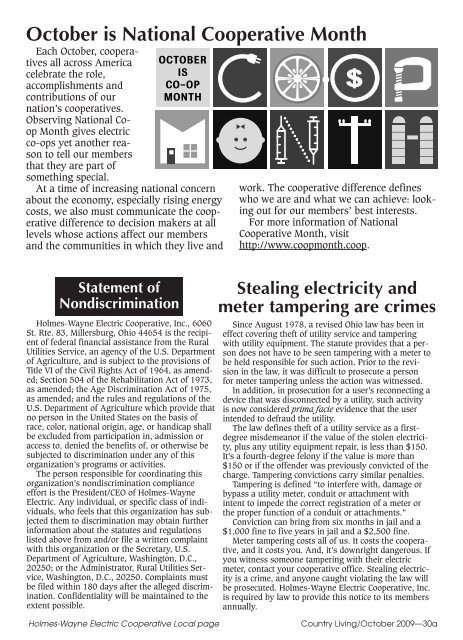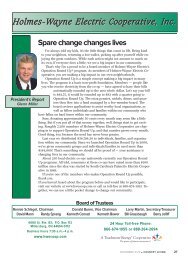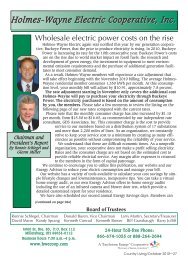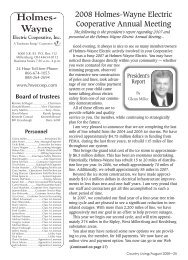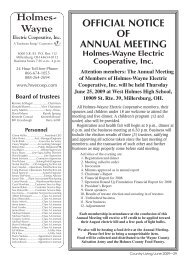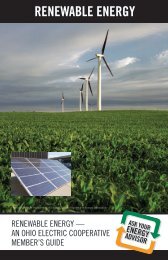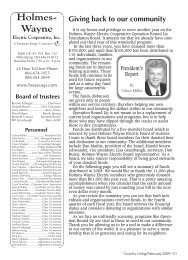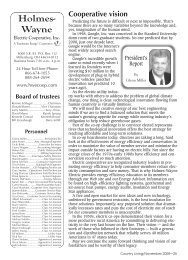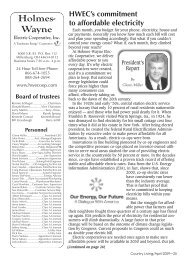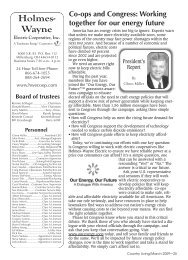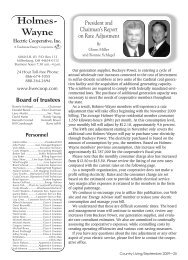October - Holmes-Wayne Electric Cooperative, Inc.
October - Holmes-Wayne Electric Cooperative, Inc.
October - Holmes-Wayne Electric Cooperative, Inc.
You also want an ePaper? Increase the reach of your titles
YUMPU automatically turns print PDFs into web optimized ePapers that Google loves.
<strong>October</strong> is National <strong>Cooperative</strong> Month<br />
Each <strong>October</strong>, cooperatives<br />
all across America<br />
celebrate the role,<br />
accomplishments and<br />
contributions of our<br />
nation’s cooperatives.<br />
Observing National Coop<br />
Month gives electric<br />
co-ops yet another reason<br />
to tell our members<br />
that they are part of<br />
something special.<br />
At a time of increasing national concern<br />
about the economy, especially rising energy<br />
costs, we also must communicate the cooperative<br />
difference to decision makers at all<br />
levels whose actions affect our members<br />
and the communities in which they live and<br />
work. The cooperative difference defines<br />
who we are and what we can achieve: looking<br />
out for our members’ best interests.<br />
For more information of National<br />
<strong>Cooperative</strong> Month, visit<br />
http://www.coopmonth.coop.<br />
Statement of<br />
Nondiscrimination<br />
<strong>Holmes</strong>-<strong>Wayne</strong> <strong>Electric</strong> <strong>Cooperative</strong>, <strong>Inc</strong>., 6060<br />
St. Rte. 83, Millersburg, Ohio 44654 is the recipient<br />
of federal financial assistance from the Rural<br />
Utilities Service, an agency of the U.S. Department<br />
of Agriculture, and is subject to the provisions of<br />
Title VI of the Civil Rights Act of 1964, as amended;<br />
Section 504 of the Rehabilitation Act of 1973,<br />
as amended; the Age Discrimination Act of 1975,<br />
as amended; and the rules and regulations of the<br />
U.S. Department of Agriculture which provide that<br />
no person in the United States on the basis of<br />
race, color, national origin, age, or handicap shall<br />
be excluded from participation in, admission or<br />
access to, denied the benefits of, or otherwise be<br />
subjected to discrimination under any of this<br />
organization’s programs or activities.<br />
The person responsible for coordinating this<br />
organization’s nondiscrimination compliance<br />
effort is the President/CEO of <strong>Holmes</strong>-<strong>Wayne</strong><br />
<strong>Electric</strong>. Any individual, or specific class of individuals,<br />
who feels that this organization has subjected<br />
them to discrimination may obtain further<br />
information about the statutes and regulations<br />
listed above from and/or file a written complaint<br />
with this organization or the Secretary, U.S.<br />
Department of Agriculture, Washington, D.C.,<br />
20250; or the Administrator, Rural Utilities Service,<br />
Washington, D.C., 20250. Complaints must<br />
be filed within 180 days after the alleged discrimination.<br />
Confidentiality will be maintained to the<br />
extent possible.<br />
Stealing electricity and<br />
meter tampering are crimes<br />
Since August 1978, a revised Ohio law has been in<br />
effect covering theft of utility service and tampering<br />
with utility equipment. The statute provides that a person<br />
does not have to be seen tampering with a meter to<br />
be held responsible for such action. Prior to the revision<br />
in the law, it was difficult to prosecute a person<br />
for meter tampering unless the action was witnessed.<br />
In addition, in prosecution for a user’s reconnecting a<br />
device that was disconnected by a utility, such activity<br />
is now considered prima facie evidence that the user<br />
intended to defraud the utility.<br />
The law defines theft of a utility service as a firstdegree<br />
misdemeanor if the value of the stolen electricity,<br />
plus any utility equipment repair, is less than $150.<br />
It’s a fourth-degree felony if the value is more than<br />
$150 or if the offender was previously convicted of the<br />
charge. Tampering convictions carry similar penalties.<br />
Tampering is defined “to interfere with, damage or<br />
bypass a utility meter, conduit or attachment with<br />
intent to impede the correct registration of a meter or<br />
the proper function of a conduit or attachments.”<br />
Conviction can bring from six months in jail and a<br />
$1,000 fine to five years in jail and a $2,500 fine.<br />
Meter tampering costs all of us. It costs the cooperative,<br />
and it costs you. And, it’s downright dangerous. If<br />
you witness someone tampering with their electric<br />
meter, contact your cooperative office. Stealing electricity<br />
is a crime, and anyone caught violating the law will<br />
be prosecuted. <strong>Holmes</strong>-<strong>Wayne</strong> <strong>Electric</strong> <strong>Cooperative</strong>, <strong>Inc</strong>.<br />
is required by law to provide this notice to its members<br />
annually.<br />
<strong>Holmes</strong>-<strong>Wayne</strong> <strong>Electric</strong> <strong>Cooperative</strong> Local page Country Living/<strong>October</strong> 2009—30a


